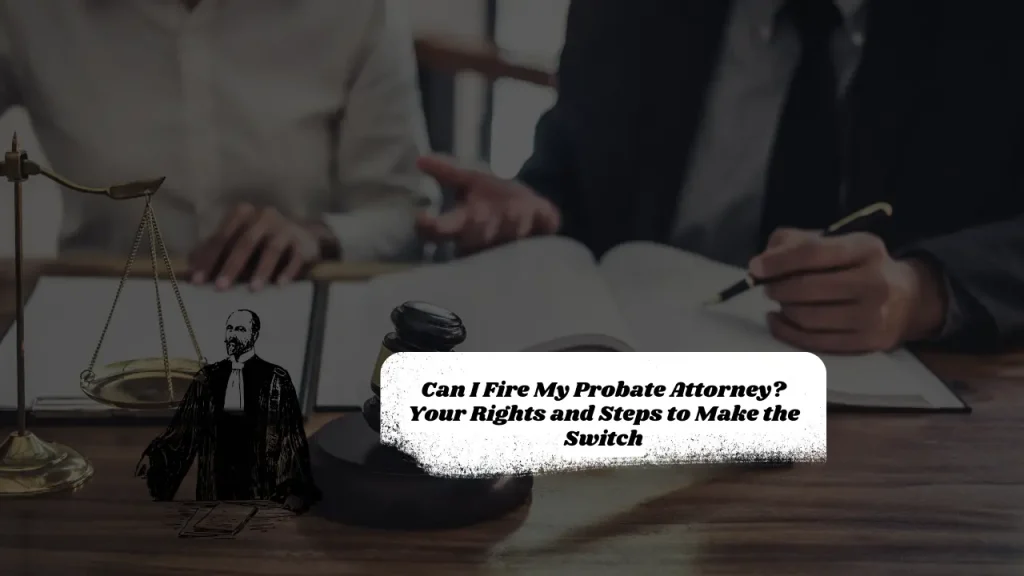Can I Fire My Probate Attorney? Your Rights and Steps to Make the Switch
Hiring a probate attorney is often essential for addressing the complexities of estate administration. But what if your attorney isn’t meeting your expectations? Can you fire them? The short answer is yes, but there are important considerations to ensure a smooth transition and avoid unnecessary complications. This guide explains your rights, the steps to take, and what to expect when changing legal representation during probate.
Key Takeaways
- You have the legal right to fire your probate attorney at any time.
- Proper communication and documentation are critical to avoid disputes or delays.
- Transitioning to a new attorney may involve additional costs and administrative steps.
Table of Contents
When Should You Consider Firing Your Probate Attorney?
Firing your attorney is a significant decision. Here are common reasons to consider it:
- Poor Communication
- Unreturned calls, missed deadlines, or lack of updates on your case.
- Lack of Expertise
- The attorney seems unfamiliar with probate laws or makes frequent errors.
- High Costs and Hidden Fees
- Unexpected bills or fees that exceed the initial estimate.
- Ethical Concerns
- Conflicts of interest, unprofessional behavior, or failure to act in your best interest.
- Personality Conflicts
- A strained relationship that hinders effective collaboration.
Example: If your attorney fails to file required documents on time, causing delays in distributing assets, it may be time to find a replacement.
Your Legal Rights When Firing an Attorney
- Right to Terminate: You can fire your attorney at any time, regardless of the reason.
- Right to Your Files: Your attorney must provide all case-related documents upon request.
- Right to a Fee Refund: If you’ve paid for services not yet rendered, you may be entitled to a partial refund.
Note: If you signed a retainer agreement, review it for termination clauses or penalties.
Related article for you:
Does TSP Go Through Probate?

Steps to Fire Your Probate Attorney
1. Notify Your Attorney in Writing
- Draft a formal termination letter stating your decision to end the relationship.
- Include:
- The effective date of termination.
- A request for your case files and a final invoice.
- Instructions for transferring the case to your new attorney (if applicable).
Sample Statement:
“This letter serves as formal notice that I am terminating your services as my probate attorney, effective [date]. Please provide all case files and a final invoice within [timeframe].”
2. Retrieve Your Case Files
- Your attorney is legally required to return all documents, including:
- Original wills, deeds, and contracts.
- Correspondence with the court, heirs, or creditors.
- Financial records and estate inventories.
Tip: Request both physical and digital copies for convenience.
3. Hire a New Attorney
- Research and interview potential replacements to ensure they’re a good fit.
- Provide the new attorney with all case files and a summary of the current status.
4. Notify the Court and Interested Parties
- Your new attorney will file a Substitution of Attorney form with the probate court.
- Inform heirs, beneficiaries, and creditors of the change in representation.
What Happens to Your Fees?
- Hourly Billing: You’re only responsible for hours worked up to the termination date.
- Flat Fees: If you paid upfront, request a refund for unearned services.
- Contingency Fees: Rare in probate cases, but ensure you’re not overcharged.
Dispute Resolution: If your attorney refuses to refund fees, file a complaint with your state bar association.
Potential Challenges When Firing Your Attorney
- Delays in Probate
- Transitioning to a new attorney may pause progress temporarily.
- Increased Costs
- A new attorney may need time to review the case, leading to additional fees.
- Attorney Resistance
- Some attorneys may withhold files or dispute fee refunds.
Solution: Stay firm, document all communications, and escalate to the state bar if necessary.
How to Avoid Problems When Hiring a New Attorney?
- Ask for Referrals
- Take recommendations from friends, family, or other attorneys.
- Check Credentials
- Verify the attorney’s experience in probate law and their standing with the state bar.
- Review the Fee Agreement
- Ensure the new attorney’s fees are transparent and reasonable.
- Communicate Expectations
- Discuss timelines, communication preferences, and case priorities upfront.
State-Specific Considerations
- California: Attorneys must provide a Notice of Withdrawal to the court and clients.
- Texas: File a Motion to Substitute Counsel with the probate court.
- Florida: Notify the court and all interested parties of the change in representation.
FAQs
Can I Fire My Attorney Mid-Case?
Yes, but ensure the transition is handled smoothly to avoid delays.
Will Firing My Attorney Delay Probate?
Possibly, but a competent replacement can minimize disruptions.
Can I Represent Myself After Firing My Attorney?
Yes, but probate is complex, and mistakes can be costly.
What If My Attorney Refuses to Return My Files?
File a complaint with your state bar association to compel compliance.
Final Checklist for Firing Your Probate Attorney
- Draft a termination letter and send it via certified mail.
- Request all case files and a final invoice.
- Hire a new attorney and provide them with the case details.
- Notify the court and interested parties of the change.
Need Help?
- State Bar Associations: File complaints or get referrals.
- Legal Aid Organizations: Free or low-cost assistance for qualifying individuals.
- Online Resources: Nolo’s Guide to Firing Your Attorney
Disclaimer: This article is for informational purposes only. Consult a licensed attorney for advice tailored to your situation.
About the Author

Sarah Klein, JD, is an experienced estate planning attorney who has helped clients with wills, trusts, powers of attorney, and probate matters. At All About Lawyer, she simplifies complex estate laws so families can protect their assets, plan ahead, and avoid legal headaches during life’s most sensitive moments.
Read more about Sarah
